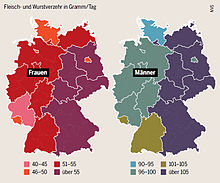Food culture


The food culture encompasses the entire cultural environment of the human diet , so for example, decoration and table manners , rituals and ceremonies , food or even regional specialties and cultural identification.
General
Culture in general is the sum of all material and immaterial values in a society . Food culture therefore includes everything that is associated with food and that has been developed and produced by humans. This includes the use of cutlery ( knife / fork , chopstick ) or not ( finger food ), the type / quality of the food and drink ( vegetarian cuisine , meat dishes ) or the duration of the meal ( fast food or slow food ).
Since ancient times, food has always had to do with social status , political and religious power (see also nutritional sociology ).
The scientific occupation with food culture is carried out through folklore food research , cultural history and nutritional sociology .
National influences
The food culture is largely shaped by national influences from the classic culinary art such as Asian cuisine (for example Chinese cuisine , Japanese cuisine or Thai cuisine ), German cuisine , French cuisine or Italian cuisine . The haute cuisine is regarded as the highest level of food culture, because it sees itself as a real art.
See also
- Drinking culture in Europe
- Food culture in the Roman Empire
- Food culture in the Middle Ages
- Eating culture of the early modern times
- Slow food
literature
- Hannsferdinand Döbler : Cooking skills and table pleasures. Orbis-Verlag, Munich 2000, ISBN 3-572-01150-7 .
- Gunther Hirschfelder : European food culture. A history of nutrition from the Stone Age to the present day. Campus, Frankfurt am Main 2001, ISBN 3-593-36815-3 .
- Friedrich Jaeger (ed.): Encyclopedia of the modern times . Vol. 3, Metzler Verlag, Stuttgart / Weimar 2006, Art. Essen. (Ed. Hasso Spode ).
- Massimo Montanari : Hunger and Abundance. CH Beck-Verlag, Munich 1999, ISBN 3-406-44025-8 .
- Christine Ott: Identity goes through the stomach. Food culture myths . Fischer, Frankfurt am Main 2017, ISBN 978-3-10-002208-0 .
- Gert von Paczensky , Anna Dünnebier: Cultural history of eating and drinking. Orbis, Munich 1999, ISBN 3-572-10047-X .
- Amalie Schneider-Schlöth : Basler Kochschule - an easy-to-understand guide to traditional and finer culinary art. 14th edition, completely revised by Andreas Morel . Basel 1983, ISBN 3724505299 . (1st edition 1877)
- Ernst Schubert : Eating and Drinking in the Middle Ages. Scientific Book Society, Darmstadt 2006, ISBN 978-3-534-19897-9 .
- Reay Tannahill: Cultural History of Food. dtv, Munich 1979 ( Food in History , London 1973).
- Alois Wierlacher (Hrsg.): Culture theme food. Views and problem areas. Berlin 1993 (= Kulturthema Essen. Volume 1).
- Johanna Maria van Winter: Cooking and Eating in the Middle Ages. In: Bernd Herrmann (Ed.): Man and the environment in the Middle Ages. Stuttgart 1986; 3rd edition ibid. 1987, pp. 88-100.
Web links
- Interesting things to do with food culture
- History of culinary arts and food culture
- Same, richer, more dangerous , article in the Frankfurter Allgemeine Zeitung about a study by the UN on the changes in global food culture over the past 50 years
Individual evidence
- ↑ Barbara Methfessel, Sociocultural Basics of Nutrition Education, in: REVIS Fachwissenschaftliche Konzeption, 2005, p. 7 f.
- ^ Rolf Sievers, Piemont-Excursion 2010 , 2010, p. 242